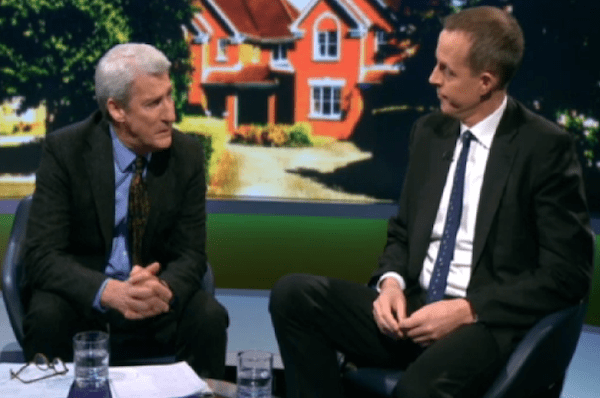Nick Boles has just put in a fierce performance on Newsnight over his controversial remarks on planning. Amusingly, the minister’s remarks aren’t a million miles away from Nick Clegg’s slightly less well-reported speech on housing last week, but Boles has a knack of going where other ministers fear to tread when he speaks about difficult issues.
He was extremely impressive on why making development a priority does not mean England is going to turn into an enormous concrete jungle, saying:
‘Under 10% of Britain, currently, 10% of England, is covered by urban development in any way. A very small amount. Over 85%, 88%, would still be rural, undeveloped countryside, and we would have completely solved our housing need for the next 20 years.
‘My view is simply this, which is that I’d prefer to live in a country, where families were able to get a property. Where 85-88% of it was developed… than the one we currently live in where okay, 91% is undeveloped, but there are people in their 40s, both working, who can’t afford to get a place.’
What Boles is doing, as well as showing off what splendidly thick skin he must have to take on the anti-development lobby, is demonstrating very aptly David Cameron’s conference commitment to ‘spread privilege’. There can be few better examples of doing this than enabling young people to get on the housing ladder, rather than allowing housing need to grow because of the objections of those who are already privileged and are worried about the impact of a new development on their view.
He is delivering a speech to the Town and Country Planning Association tomorrow which will make many more blunt observations, arguing that some of the antipathy towards new development stems from the reasonable observation that many new homes are ‘pig ugly’. In his interventions over the past few days, Boles is tackling those opposed to new development from two sides. He is appealing to their desire for their own children and the young people in their own communities to be able to afford a home, while also acknowledging their fears about the aesthetic impact of development.
Perhaps to move from the dismal 129,790 house starts in England in 2011/12 to the 250,000 a year economists believe are needed, David Cameron could set Boles a challenge similar to Winston Churchill’s deal with Harold Macmillan when he became housing minister in 1954 to meet a target of 300,000 new homes per year. Churchill told Macmillan:
‘It is a gamble – it will make or mar your political career, but every humble home will bless your name if you succeed.’
The minister did succeed: a year ahead of schedule, in fact, and his subsequent rise through the ranks to become Chancellor and finally Prime Minister shows he enjoyed the spoils of success. The planning portfolio more than perhaps any other in this government needs someone who is bold, thick-skinned, and absolutely driven. We have been building far too few homes in this country for years, and if Bold Boles is able to turn that around, then he deserves a big reward.







Comments